初中英语作业设计与评价漫谈
- 格式:doc
- 大小:26.00 KB
- 文档页数:3
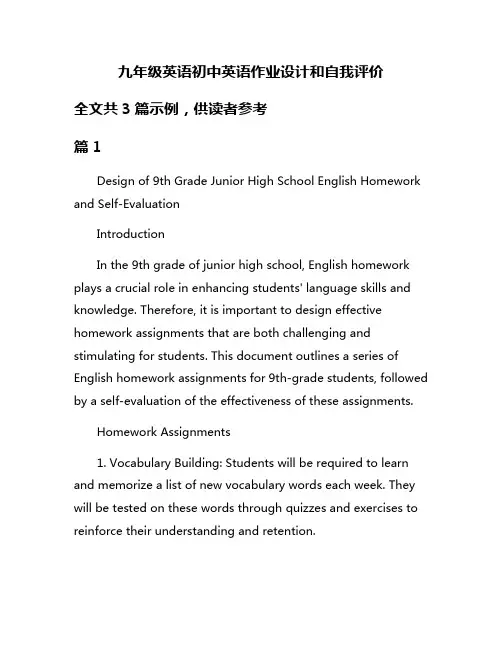
九年级英语初中英语作业设计和自我评价全文共3篇示例,供读者参考篇1Design of 9th Grade Junior High School English Homework and Self-EvaluationIntroductionIn the 9th grade of junior high school, English homework plays a crucial role in enhancing students' language skills and knowledge. Therefore, it is important to design effective homework assignments that are both challenging and stimulating for students. This document outlines a series of English homework assignments for 9th-grade students, followed by a self-evaluation of the effectiveness of these assignments.Homework Assignments1. Vocabulary Building: Students will be required to learn and memorize a list of new vocabulary words each week. They will be tested on these words through quizzes and exercises to reinforce their understanding and retention.2. Reading Comprehension: Students will be assigned short passages or articles to read and answer questions on. This will help improve their reading comprehension skills and their ability to analyze and interpret written texts.3. Writing Assignments: Students will be given writing assignments such as essays, letters, or creative writing exercises. These assignments will focus on different aspects of writing, including grammar, vocabulary usage, and organization.4. Listening and Speaking: Students will be required to listen to audio recordings or videos and answer questions based on what they have heard. They will also be assigned speaking tasks, such as conversational exercises or presentations, to improve their oral communication skills.5. Grammar Exercises: Students will be given grammar exercises to practice different grammar rules and structures. These exercises will help reinforce their understanding of English grammar and usage.Self-EvaluationAs a teacher, it is important to evaluate the effectiveness of homework assignments in order to make necessary adjustments and improvements. Therefore, I conducted a self-evaluation ofthe homework assignments outlined above based on the following criteria:1. Engagement: Are the homework assignments engaging and stimulating for students? Do they encourage active participation and independent learning?2. Relevance: Are the homework assignments relevant to students' learning goals and objectives? Do they help students achieve their language learning objectives?3. Challenge: Are the homework assignments challenging enough for students? Do they provide opportunities for students to extend their knowledge and skills?4. Feedback: Do the homework assignments provide students with timely and constructive feedback on their performance? Do they help students identify areas for improvement?Based on my self-evaluation, I found that the homework assignments were generally effective in engaging students, providing relevant learning opportunities, and challenging students to extend their knowledge and skills. However, there were areas for improvement, such as providing more detailedfeedback and incorporating more interactive and collaborative activities.In conclusion, designing effective homework assignments for 9th-grade students is essential for enhancing their language skills and knowledge. By implementing a variety of assignments that focus on vocabulary building, reading comprehension, writing, listening, speaking, and grammar, students can develop a well-rounded understanding of the English language. Additionally, conducting regular self-evaluations of homework assignments can help teachers identify areas for improvement and ensure that students are receiving the support they need to succeed.篇2Title: Design and Self-evaluation of 9th Grade Middle School English HomeworkIntroductionIn the 9th grade of middle school, English homework plays a crucial role in consolidating knowledge, improving skills, and fostering self-discipline. As a student, I have designed a series of English homework assignments for myself and would like to evaluate their effectiveness in improving my English proficiency.Homework Design1. Vocabulary Expansion: To enhance my vocabulary, I have created a daily vocabulary practice where I learn five new words each day. I write down their meanings, use them in sentences, and review them regularly to ensure retention.2. Reading Comprehension: To improve my reading skills, I have selected a variety of English articles, short stories, and novels to read and analyze. After reading, I summarize the main points, identify key vocabulary, and answer comprehension questions.3. Writing Exercises: To enhance my writing skills, I regularly practice writing essays, stories, letters, and reports. I pay close attention to grammar, punctuation, and coherence, seeking feedback from teachers or peers to improve my writing proficiency.4. Listening Practice: To develop my listening skills, I listen to English podcasts, songs, and videos on a daily basis. I take notes, summarize the main points, and engage in discussions or quizzes to test my understanding.5. Speaking Practice: To boost my speaking skills, I participate in English-speaking clubs, practice dialogues withclassmates, and record myself speaking on various topics. I focus on pronunciation, intonation, and fluency to improve my spoken English.Self-evaluation1. Vocabulary Expansion: By consistently learning new words and reviewing them, I have noticed a significant improvement in my vocabulary range. I feel more confident in expressing myself and understanding complex texts.2. Reading Comprehension: Through regular reading and analysis, my reading comprehension has improved noticeably. I can now comprehend and interpret texts more effectively, identifying key information and analyzing the author's purpose.3. Writing Exercises: My writing skills have shown significant progress as I have focused on practicing different types of writing and seeking feedback for improvement. I now write more cohesively, accurately, and creatively, showcasing a better understanding of grammar and structure.4. Listening Practice: Listening to English content daily has sharpened my listening skills, allowing me to understand various accents and speech patterns. I can now follow conversations,lectures, and presentations more easily, picking up key information and nuances.5. Speaking Practice: Engaging in speaking activities has boosted my confidence in speaking English fluently and accurately. I can now articulate my thoughts clearly, engage in discussions confidently, and participate in oral presentations with ease.ConclusionDesigning and evaluating my 9th-grade English homework has proven to be an effective strategy in enhancing my English proficiency. By focusing on vocabulary expansion, reading comprehension, writing exercises, listening practice, and speaking practice, I have witnessed significant improvements in all areas of English language learning. Moving forward, I plan to continue implementing these homework assignments to further enhance my English skills and achieve greater proficiency.篇3Class: Grade 9Subject: EnglishTopic: English Homework Design and Self EvaluationAs a ninth grade student, English homework plays a critical role in my learning process. It helps me to improve my language skills, expand my vocabulary, and enhance my comprehension abilities. In this document, I will outline a comprehensive plan for designing effective English homework assignments and evaluate my own performance in completing these assignments.Homework Design:1. Reading Assignments: Reading is an essential aspect of language learning. To improve my reading skills, I will assign myself various texts, including short stories, newspaper articles, and essays. After reading each text, I will summarize the key points, identify the main ideas, and analyze the author's writing style. This will help me to enhance my comprehension skills and develop a deeper understanding of the English language.2. Vocabulary Exercises: Vocabulary is the foundation of language learning. To expand my vocabulary, I will create flashcards with new words, their meanings, and example sentences. I will review these flashcards regularly and use the new words in context to reinforce my understanding. Additionally, I will practice spelling and pronunciation to ensure that I can use the words correctly in conversation and writing.3. Writing Prompts: Writing is a crucial skill in English language learning. To improve my writing abilities, I will assign myself regular writing prompts on various topics, such as personal experiences, current events, and creative stories. I will focus on organizing my ideas, structuring my paragraphs, and using proper grammar and punctuation. Additionally, I will revise my writing for clarity, coherence, and conciseness to enhance the quality of my compositions.Self Evaluation:1. Reading Skills: I believe that my reading skills have improved significantly over the past year. I have developed the ability to understand complex texts, analyze the author's arguments, and evaluate different perspectives. However, I still need to work on reading more diverse materials and expanding my knowledge of different genres and writing styles.2. Vocabulary Expansion: My vocabulary has grown considerably through my English homework assignments. I have learned new words and phrases, improved my spelling and pronunciation, and used advanced vocabulary in my writing. Nevertheless, I need to continue expanding my vocabulary by exploring more challenging texts, engaging in conversations with native speakers, and studying vocabulary-specific materials.3. Writing Proficiency: Writing has always been a challenging aspect of English language learning for me. While I have made progress in organizing my ideas, structuring my essays, and using proper grammar, there is still room for improvement. I need to focus on developing my writing style, enhancing my sentence structure, and refining my editing skills to produce high-quality compositions.Overall, I am satisfied with my performance in completing English homework assignments in the ninth grade. I have demonstrated a strong commitment to improving my language skills, expanding my vocabulary, and honing my writing abilities. Moving forward, I will continue to design effective homework assignments, evaluate my progress regularly, and strive for excellence in all aspects of English language learning.。
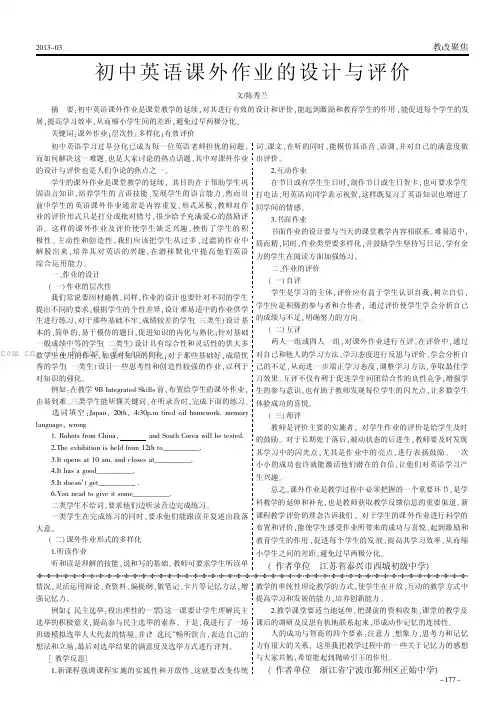
2013-03教改聚焦情况,灵活运用辩论、查资料、编提纲、做笔记、卡片等记忆方法,增强记忆力。
例如,《民主选举:投出理性的一票》这一课要让学生理解民主选举的积极意义,提高参与民主选举的素养。
于是,我进行了一场班级模拟选举人大代表的情境,并让“选民”畅所欲言,表达自己的想法和立场,最后对选举结果的满意度及选举方式进行评判。
[教学反思]1.新课程强调课程实施的实践性和开放性,这就要改变传统教学的单纯性理论教学的方式,使学生在开放、互动的教学方式中提高学习和发展的能力,培养创新能力。
2.教学课堂要适当地延伸,把课前的资料收集、课堂的教学及课后的调研及反思有机地联系起来,形成动作记忆的连续性。
人的成功与智商的四个要素:注意力、想象力、思考力和记忆力有很大的关系,这里我把教学过程中的一些关于记忆力的感想与大家共勉,希望能起到抛砖引玉的作用。
(作者单位浙江省宁波市鄞州区正始中学)初中英语课外作业的设计与评价文/陈秀兰初中英语学习过早分化已成为每一位英语老师担忧的问题,而如何解决这一难题,也是大家讨论的热点话题,其中对课外作业的设计与评价也是人们争论的焦点之一。
学生的课外作业是课堂教学的延续,其目的在于帮助学生巩固语言知识,培养学生的言语技能、发展学生的语言能力,然而目前中学生的英语课外作业通常是内容重复,形式呆板,教师对作业的评价形式只是打分或批对错号,很少给予充满爱心的鼓励评语。
这样的课外作业及评价使学生缺乏兴趣,挫伤了学生的积极性。
主动性和创造性,我们应该把学生从过多、过滥的作业中解脱出来,培养其对英语的兴趣,在潜移默化中提高他们英语综合运用能力。
一、作业的设计(一)作业的层次性我们常说要因材施教,同样,作业的设计也要针对不同的学生提出不同的要求,根据学生的个性差异,设计难易适中的作业供学生进行练习,对于那些基础不牢,成绩较差的学生(三类生)设计基本的、简单的,易于模仿的题目,促进知识的内化与熟化;针对基础一般成绩中等的学生(二类生)设计具有综合性和灵活性的供大多数学生使用的作业,加强对知识的同化;对于那些基础好,成绩优秀的学生(一类生)设计一些思考性和创造性较强的作业,以利于对知识的强化。
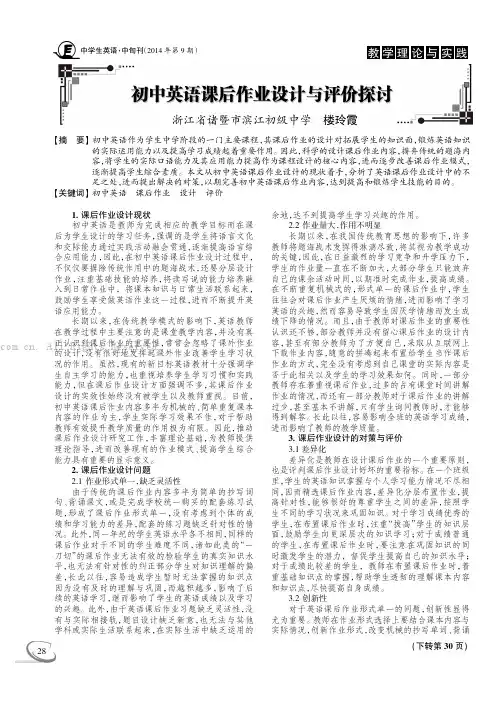
【摘要】初中英语作为学生中学阶段的一门主要课程,其课后作业的设计对拓展学生的知识面,锻炼英语知识的实际运用能力以及提高学习成绩起着重要作用。
因此,科学的设计课后作业内容,摒弃传统的题海内容,将学生的实际口语能力及其应用能力提高作为课程设计的核心内容,进而逐步改善课后作业模式,逐渐提高学生综合素质。
本文从初中英语课后作业设计的现状着手,分析了英语课后作业设计中的不足之处,进而提出解决的对策,以期完善初中英语课后作业内容,达到提高和锻炼学生技能的目的。
【关键词】初中英语课后作业设计评价初中英语课后作业设计与评价探讨浙江省诸暨市滨江初级中学楼玲霞1.课后作业设计现状初中英语是教师为完成相应的教学目标而在课后为学生设计的学习任务,强调的是学生将语言文化和交际能力通过实践活动融会贯通,逐渐提高语言综合应用能力,因此,在初中英语课后作业设计过程中,不仅仅要摒除传统作用中的题海战术,还要分层设计作业,注重基础技能的培养,将读写说的能力培养融入到日常作业中,将课本知识与日常生活联系起来,鼓励学生享受做英语作业这一过程,进而不断提升英语应用能力。
长期以来,在传统教学模式的影响下,英语教师在教学过程中主要注意的是课堂教学内容,并没有真正认识到课后作业的重要性,常常会忽略了课外作业的设计,没有很好地发挥起课外作业改善学生学习状况的作用。
虽然,现有的新目标英语教材十分强调学生自主学习的能力,也重视培养学生学习习惯和实践能力,但在课后作业设计方面强调不多,其课后作业设计的实效性始终没有被学生以及教师重视。
目前,初中英语课后作业内容多半为机械的、简单重复课本内容的作业为主,学生实际学习效果不佳,对于帮助教师有效提升教学质量的作用极为有限。
因此,推动课后作业设计研究工作,丰富理论基础,为教师提供理论指导,进而改善现有的作业模式、提高学生综合能力具有重要的显示意义。
2.课后作业设计问题2.1作业形式单一,缺乏灵活性由于传统的课后作业内容多半为简单的抄写词句、背诵课文,或是完成学校统一购买的配套练习试题,形成了课后作业形式单一,没有考虑到个体的成绩和学习能力的差异,配套的练习题缺乏针对性的情况。
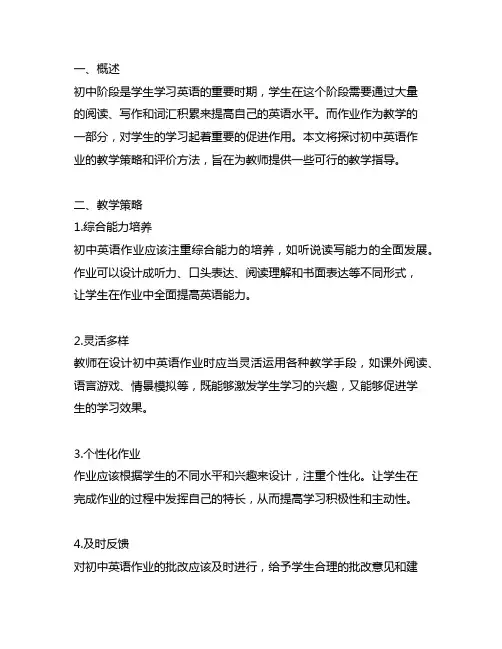
一、概述初中阶段是学生学习英语的重要时期,学生在这个阶段需要通过大量的阅读、写作和词汇积累来提高自己的英语水平。
而作业作为教学的一部分,对学生的学习起着重要的促进作用。
本文将探讨初中英语作业的教学策略和评价方法,旨在为教师提供一些可行的教学指导。
二、教学策略1.综合能力培养初中英语作业应该注重综合能力的培养,如听说读写能力的全面发展。
作业可以设计成听力、口头表达、阅读理解和书面表达等不同形式,让学生在作业中全面提高英语能力。
2.灵活多样教师在设计初中英语作业时应当灵活运用各种教学手段,如课外阅读、语言游戏、情景模拟等,既能够激发学生学习的兴趣,又能够促进学生的学习效果。
3.个性化作业作业应该根据学生的不同水平和兴趣来设计,注重个性化。
让学生在完成作业的过程中发挥自己的特长,从而提高学习积极性和主动性。
4.及时反馈对初中英语作业的批改应该及时进行,给予学生合理的批改意见和建议。
及时的反馈可以让学生在错误中找到自己的不足,及时改正,有助于提高学习效果。
5.合作学习运用合作学习的方式设计初中英语作业,让学生在合作中相互促进,相互学习,从而培养学生的团队合作精神和交流能力。
三、评价方法1.量化评价初中英语作业的评价方法应该是量化的,可以通过分数或其他具体的方式对学生的作业进行评价。
这样既能客观地反映学生的学习水平,也能够将学生的学习动力提高。
2.综合评价除了对学生书面作业的评分外,初中英语作业的评价还应该综合考虑学生的口头表达、听力能力等方面的情况,从多方面全面地评价学生的学习水平。
3.及时反馈对学生的作业应该及时进行批改和反馈,让学生能够及时了解自己作业的不足,及时进行改正。
教师也可以在反馈中对学生提出具体的改进建议,引导学生进行更有效的学习。
4.鼓励性评价在评价初中英语作业时,教师需要注重鼓励,及时表扬学生的优点和努力,并给予适当的奖励。
这样可以增强学生的自信心,激发学生学习的热情。
5.学生自评在评价初中英语作业时,可以让学生进行自评,让学生了解自己的不足和进步,自觉调整学习状态,更好地提高学习效果。
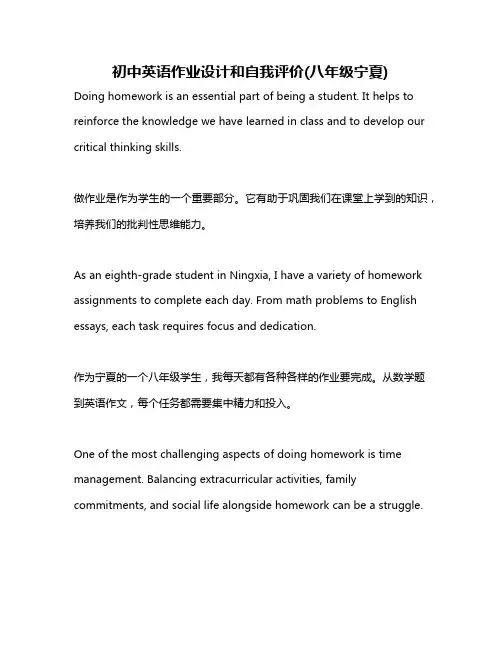
初中英语作业设计和自我评价(八年级宁夏)Doing homework is an essential part of being a student. It helps to reinforce the knowledge we have learned in class and to develop our critical thinking skills.做作业是作为学生的一个重要部分。
它有助于巩固我们在课堂上学到的知识,培养我们的批判性思维能力。
As an eighth-grade student in Ningxia, I have a variety of homework assignments to complete each day. From math problems to English essays, each task requires focus and dedication.作为宁夏的一个八年级学生,我每天都有各种各样的作业要完成。
从数学题到英语作文,每个任务都需要集中精力和投入。
One of the most challenging aspects of doing homework is time management. Balancing extracurricular activities, family commitments, and social life alongside homework can be a struggle.做作业最具挑战性的一个方面是时间管理。
在课外活动、家庭承诺和社交生活与作业之间取得平衡可能是一种挣扎。
However, I have learned the importance of prioritizing tasks and setting aside dedicated time for homework. This has helped me to stay organized and complete my assignments on time.然而,我已经意识到了优先安排任务和留出专门时间做作业的重要性。

ENGLISH ON CAMPUS2023年11期总第659期基于单元整体教学的初中英语作业有效设计与评价摘 要:英语教学具有较强的实用性,学生通过系统的英语听说读写训练,能够为后续的发展做好铺垫。
在英语新课改不断渗透的当前,学习英语知识应完成从单一教学向单元教学的转变,这是由于单元知识点的互补优势明显,且具有主题统一性,能够帮助学生更好地搭建英语知识学习体系。
而单元整体教学中的英语作业设计与评价,能够帮助学生巩固对体系化英语知识的学习,提高学生的英语综合学习能力。
本文就此展开论述。
关键词:英语作业;初中;单元整体教学作者简介:刘东,酒泉市第一中学。
作为学习中的一个重要环节,英语作业是对课堂教学内容进行反馈与巩固的主要方式。
近年来,教师在设计教学环节时更为关注单元整体的教学设计,作为教学活动的评价与跟进环节,设计作业应体现单元内容的独立性及完整性,以单元为依据对英语知识进行拓展教学。
还应对学生的作业内容进行评价,确保了解学生的真实学习情况,并保证学生学习能力的提升。
一、单元整体教学的初中英语作业有效设计(一)设计层次作业初中阶段学生的英语学习能力具有一定的差异,而程式化、统一化的作业内容,不适合所有学生,所以,教师可以根据不同学生的不同学习能力、学习兴趣、学习环境等为学生设计分层作业,这样可以在对学生学习差异进行尊重的基础上,帮助学生找到学习平衡点,也能在整体层面促进班级英语学习水平的提升。
差异化的作业内容,可以确保不同层次的学生都可以完成与自身学习能力相符的作业,进而获得不同程度的提升。
例如,在学习冀教版初中英语七年级上册Unit1“School and friends”单元知识内容的环节,为确保不同层面的学生都能在自身认知能力的基础上完成作业内容,教师可以为学生设置分层作业。
七年级学生的词汇学习难度及语言难度,对于自主学习能力较强的学生而言,相对较低;但基础学习能力薄弱的学生,在学习的过程中,就会感觉到一定的难度,因此,教师可以将单元内基础知识学习内容分为两个层面。
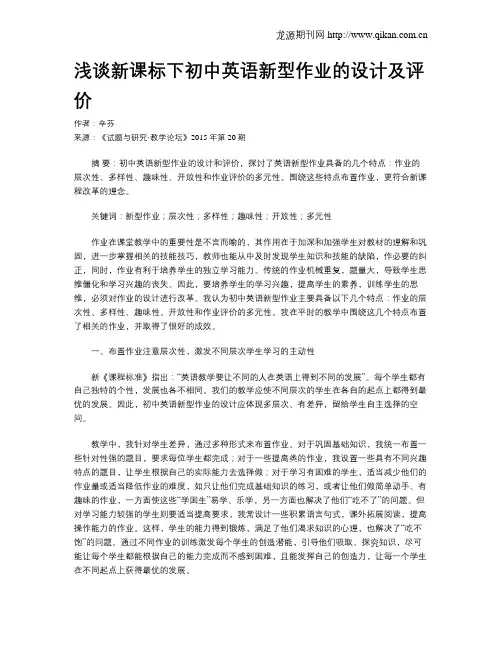
浅谈新课标下初中英语新型作业的设计及评价作者:辛芬来源:《试题与研究·教学论坛》2015年第20期摘要:初中英语新型作业的设计和评价,探讨了英语新型作业具备的几个特点:作业的层次性、多样性、趣味性、开放性和作业评价的多元性。
围绕这些特点布置作业,更符合新课程改革的理念。
关键词:新型作业;层次性;多样性;趣味性;开放性;多元性作业在课堂教学中的重要性是不言而喻的,其作用在于加深和加强学生对教材的理解和巩固,进一步掌握相关的技能技巧,教师也能从中及时发现学生知识和技能的缺陷,作必要的纠正,同时,作业有利于培养学生的独立学习能力。
传统的作业机械重复,题量大,导致学生思维僵化和学习兴趣的丧失。
因此,要培养学生的学习兴趣,提高学生的素养,训练学生的思维,必须对作业的设计进行改革。
我认为初中英语新型作业主要具备以下几个特点:作业的层次性、多样性、趣味性、开放性和作业评价的多元性。
我在平时的教学中围绕这几个特点布置了相关的作业,并取得了很好的成效。
一、布置作业注意层次性,激发不同层次学生学习的主动性新《课程标准》指出:“英语教学要让不同的人在英语上得到不同的发展”。
每个学生都有自己独特的个性,发展也各不相同。
我们的教学应使不同层次的学生在各自的起点上都得到最优的发展。
因此,初中英语新型作业的设计应体现多层次、有差异,留给学生自主选择的空间。
教学中,我针对学生差异,通过多种形式来布置作业。
对于巩固基础知识,我统一布置一些针对性强的题目,要求每位学生都完成;对于一些提高类的作业,我设置一些具有不同兴趣特点的题目,让学生根据自己的实际能力去选择做;对于学习有困难的学生,适当减少他们的作业量或适当降低作业的难度,如只让他们完成基础知识的练习,或者让他们做简单动手、有趣味的作业,一方面使这些“学困生”易学、乐学,另一方面也解决了他们“吃不了”的问题。
但对学习能力较强的学生则要适当提高要求,我常设计一些积累语言句式,课外拓展阅读,提高操作能力的作业。
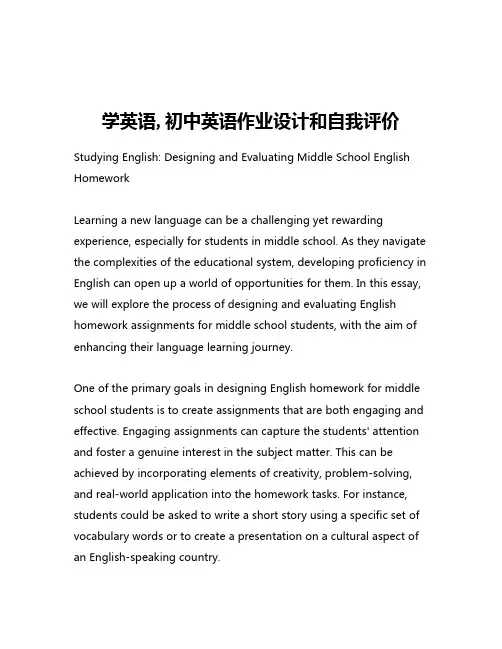
学英语,初中英语作业设计和自我评价Studying English: Designing and Evaluating Middle School English HomeworkLearning a new language can be a challenging yet rewarding experience, especially for students in middle school. As they navigate the complexities of the educational system, developing proficiency in English can open up a world of opportunities for them. In this essay, we will explore the process of designing and evaluating English homework assignments for middle school students, with the aim of enhancing their language learning journey.One of the primary goals in designing English homework for middle school students is to create assignments that are both engaging and effective. Engaging assignments can capture the students' attention and foster a genuine interest in the subject matter. This can be achieved by incorporating elements of creativity, problem-solving, and real-world application into the homework tasks. For instance, students could be asked to write a short story using a specific set of vocabulary words or to create a presentation on a cultural aspect of an English-speaking country.In addition to being engaging, the homework assignments should also be tailored to the specific learning needs and abilities of the middle school students. This requires a thorough understanding of the students' current proficiency levels, their strengths, and areas for improvement. By conducting regular assessments and monitoring the students' progress, teachers can adjust the homework accordingly, ensuring that it challenges the students without overwhelming them.One effective strategy for designing English homework is to incorporate a variety of task types that cater to different learning styles. This could include written assignments, such as essays or short responses, as well as oral activities, such as dialogues or presentations. By diversifying the homework tasks, teachers can appeal to the diverse learning preferences of their students and provide them with opportunities to practice various language skills.Another crucial aspect of homework design is the integration of feedback and self-evaluation. Providing students with timely and constructive feedback on their homework assignments not only helps them identify areas for improvement but also fosters a sense of ownership and accountability in their learning process. Additionally, encouraging students to engage in self-evaluation can empower them to take an active role in their language learning journey, reflecting on their progress and setting personal goals forimprovement.When it comes to evaluating the effectiveness of English homework assignments, teachers should consider a range of factors. One key metric is the level of student engagement and participation. If students consistently struggle with the homework or exhibit a lack of interest, it may be an indication that the assignments need to be revised or adjusted. Additionally, teachers can analyze the quality of the students' work, looking for areas where they excel or struggle, and use this information to inform future homework design.Another important aspect of evaluation is the alignment between the homework assignments and the overall learning objectives for the course. Homework should be designed to reinforce and complement the concepts and skills being taught in the classroom, ensuring a cohesive and comprehensive learning experience for the students.Furthermore, teachers should consider the feedback they receive from students, both formal and informal. By actively soliciting student input, teachers can gain valuable insights into the students' perceptions of the homework, their challenges, and their suggestions for improvement. This feedback can then be incorporated into the ongoing refinement of the homework assignments.In conclusion, designing and evaluating English homework formiddle school students is a crucial aspect of language learning. By creating engaging, targeted, and diverse assignments, teachers can foster a love for the English language and empower their students to become proficient communicators. Through regular assessment, feedback, and self-evaluation, teachers can continuously refine and improve the homework process, ensuring that their students receive the support and guidance they need to succeed in their language learning journey.。

探究初中英语教学中的作业设计初中英语教学中的作业设计对学生的语言学习起着重要的作用。
合理设计的作业既可以巩固学生在课堂上学到的知识,又可以培养学生的学习兴趣和自主学习能力。
本文将从三个方面探究初中英语教学中的作业设计:作业的种类、作业的要求和作业的评价。
作业的种类多种多样,既有书面作业,也有口头作业。
书面作业包括填空题、选择题、阅读理解题等等;口头作业包括课堂演讲、小组合作等。
通过不同种类的作业设计,可以让学生在实践中发展自己的英语技能。
通过填空题和选择题,可以帮助学生复习和巩固语法知识,提高语言运用能力;通过阅读理解题,可以培养学生的阅读理解能力和信息获取能力;通过课堂演讲,可以锻炼学生的口语表达能力和自信心。
作业的要求应当明确并与教学目标相一致。
作业应当与教材内容紧密结合,既有难度适中的练习,又能引导学生思考和运用所学知识。
作业要求应该具体明确,例如要求学生完成一篇短文、回答问题等等。
作业设计应该符合学生的认知水平和能力,能够激发学生的学习兴趣,同时也要鼓励学生进行自主学习和创造性思考。
作业要求还应具有时效性,不宜过于长久,以免影响学生的动力和积极性。
作业的评价是作业设计的重要环节。
通过对作业的评价,可以及时发现学生的学习问题和困难,进行有效的指导和帮助。
评价的方式可以通过老师的批改和评语,也可以通过学生之间的互评和自评。
评价应当客观公正,鼓励学生的努力和进步,同时也应该指出学生的不足和需要改进的地方。
评价可以通过分数来体现,也可以通过奖励和鼓励来激励学生。
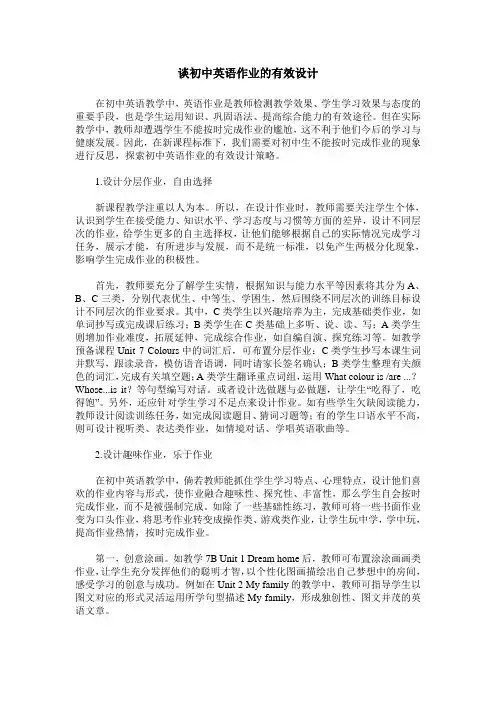
谈初中英语作业的有效设计在初中英语教学中,英语作业是教师检测教学效果、学生学习效果与态度的重要手段,也是学生运用知识、巩固语法、提高综合能力的有效途径。
但在实际教学中,教师却遭遇学生不能按时完成作业的尴尬,这不利于他们今后的学习与健康发展。
因此,在新课程标准下,我们需要对初中生不能按时完成作业的现象进行反思,探索初中英语作业的有效设计策略。
1.设计分层作业,自由选择新课程教学注重以人为本。
所以,在设计作业时,教师需要关注学生个体,认识到学生在接受能力、知识水平、学习态度与习惯等方面的差异,设计不同层次的作业,给学生更多的自主选择权,让他们能够根据自己的实际情况完成学习任务,展示才能,有所进步与发展,而不是统一标准,以免产生两极分化现象,影响学生完成作业的积极性。
首先,教师要充分了解学生实情,根据知识与能力水平等因素将其分为A、B、C三类,分别代表优生、中等生、学困生,然后围绕不同层次的训练目标设计不同层次的作业要求。
其中,C类学生以兴趣培养为主,完成基础类作业,如单词抄写或完成课后练习;B类学生在C类基础上多听、说、读、写;A类学生则增加作业难度,拓展延伸,完成综合作业,如自编自演、探究练习等。
如教学预备课程Unit 7 Colours中的词汇后,可布置分层作业:C类学生抄写本课生词并默写,跟读录音,模仿语音语调,同时请家长签名确认;B类学生整理有关颜色的词汇,完成有关填空题;A类学生翻译重点词组,运用What colour is /are ...?Whose...is it?等句型编写对话。
或者设计选做题与必做题,让学生“吃得了,吃得饱”。
另外,还应针对学生学习不足点来设计作业。
如有些学生欠缺阅读能力,教师设计阅读训练任务,如完成阅读题目、猜词习题等;有的学生口语水平不高,则可设计视听类、表达类作业,如情境对话、学唱英语歌曲等。
2.设计趣味作业,乐于作业在初中英语教学中,倘若教师能抓住学生学习特点、心理特点,设计他们喜欢的作业内容与形式,使作业融合趣味性、探究性、丰富性,那么学生自会按时完成作业,而不是被强制完成。

课舔下篡谣椎垃泼游匈潞谧摅唆。
师宗县丹凤镇第一中学余愿保英语作业是课堂教学的重要补充和延伸,是发展学生智力及整体素质的有效途径,它是课堂教学的一种组织形式,也是对教师教学信息的反馈途径。
但目前学生的作业方式多是“一背、二抄、三练习”,缺乏实践性、应用性、创新性和趣味性,作业只是强制的活动和机械的重复训练。
不利于学生综合能力的发展。
因此,教师应改变传统的作业,从单一的着眼于巩固知识的机械训练向提高学生运用知识的能力和培养情感、态度、创新精神和实践能力的实践性作业转变。
1.作业设计兽贴进学生酌实际语言不是支离破碎的条文和规则,而是活生生,的,有情景、有语境的整体。
所以,如何使语言知识生动化。
使我们的学生学习感兴趣是教师布置作业的首要问题,因此,从新课标的理念出发,英语作业只有贴近学生的实际才能激发学生的学习兴趣。
如《英语(新目标)》教材八年级英语u11i t2w l lat s houl d I do,教师应通过范文学习,让学生自由讨论,设计自已远大的理想目标。
之后.将其整理为“1w mbe a…i nt e n vea I s”。
它要求学生充分想象6年后、10年后自已打算做什么?成为哪一方面的人才?这是一个很好的话题。
理想是催人上进的动力,它能极大地激励学生从现在做起,实现自已美好的理想目标。
这样的作业既贴近学生的生活,大大调动了学生学习与运用语言的兴趣,又能提高学生人际交往的能力,从而在教学活动中积极地参与和完成真实的作业任务。
二作业设计暑有多屠性和选择性传统作业布置多为统一形式的背诵、抄写和练习.注重作业的程式化和规范化,重量而不重质。
这种作业形式完全忽视了学生的需要,导致学生产生厌烦情绪。
缺乏学习兴趣。
在教学中,教师必须承认个体差异,看到学生在兴趣、爱好、思想认识、情感态度和审美情趣等方面的差异。
因此,我们在设计作业时,在容量上既不要增加学生负担,又要尽可能发挥学生的潜能。
同时,教师应根据学生知识水平的差异,设计出难、中、易三个层次的作业,以满足不同层次的学生需要。
初中英语作业设计和自我评价七年级宁夏全文共10篇示例,供读者参考篇1Oh my gosh! It's finally time to write my seven grade English homework about designing a homework assignment andself-evaluation. I'm so excited to share all the cool things I've learned in English class this year.First, let's talk about designing a homework assignment. I think it's super important to make the assignment fun and interesting, so that students will actually want to do it. For example, we could create a project where we have to write and perform a skit in English. Or we could have a mini book report where we share our favorite book with the class. I also think it's important to have a mix of different types of assignments, like writing, speaking, and reading.Next, let's talk about self-evaluation. I think it's really important to reflect on our work and see how we can improve. One way to do this is by setting goals for ourselves at the beginning of the year and then revisiting them throughout the year to see how we're doing. I also think it's important to ask forfeedback from our teachers and classmates, so we can see where we need to improve.Overall, I think English class this year has been super fun and I've learned a lot. I've really enjoyed writing stories and learning new vocabulary words. I think I've improved a lot in my reading and speaking skills, but I still need to work on my grammar. I'm excited to keep learning and growing in English class next year!篇2Hello everyone! Today I'm going to talk about my 7th grade English homework in Ningxia.First, let me tell you about the design of my English homework in 7th grade. Our teacher usually gives us a variety of assignments, such as writing essays, reading comprehension exercises, vocabulary quizzes, and speaking activities. Sometimes we have group projects where we have to work together to create a presentation or a short skit in English. I really enjoy these group projects because they help me practice my speaking and listening skills.When it comes to self-evaluation, I think I have improved a lot in my English skills this year. I used to struggle with grammar and vocabulary, but now I can write longer essays andunderstand more complex reading passages. I still have some trouble with pronunciation, but I am working on it. I also think I need to practice speaking more so that I can become more confident in conversations.Overall, I am happy with my progress in English this year. I will continue to study hard and practice my English skills so that I can become even better in the future. I hope to be able to speak fluently and confidently in English one day. Thank you for listening to my English homework reflection!篇3Hello everyone, I'm a seventh grade student from Ningxia. Today, I want to share with you my experience in designing an English homework assignment and evaluate my own performance.For our English homework design, I chose to create a project that required students to research and present on a famous British author. I made a worksheet with questions about the author's life, works, and impact on literature. I also included a creative element where students had to write a short story inspired by the author's work.I spent a lot of time researching and planning this assignment. I wanted to make sure it was both educational and fun for my classmates. I also made sure to include clear instructions and examples to help them understand what was expected.During the presentation of my assignment, I was a little nervous at first, but once I started talking about the author and their works, I felt more confident. My classmates seemed engaged and asked some great questions. Overall, I think the assignment was a success.In terms of self-evaluation, I think I did a good job on the research and planning of the assignment. I put a lot of effort into making it interesting and informative for my classmates. However, I could have been more confident during the presentation. Next time, I will practice more and try to relax before speaking in front of the class.Overall, I am proud of the English homework assignment I designed. It was a great learning experience for me and I enjoyed sharing my knowledge with my classmates. I look forward to creating more fun and engaging assignments in the future. Thank you for listening!篇4Hey guys! Today I'm going to talk about my seventh grade English homework assignment and self-evaluation in Ningxia.So, for our English homework in seventh grade, we had to design a poster about famous landmarks around the world. I chose the Great Wall of China as my landmark because it's in Ningxia and it's super cool! I included lots of pictures and fun facts about the Great Wall on my poster. I even added some Chinese characters to make it look extra awesome.I worked really hard on my poster and I think it turned out great! I made sure to use colorful markers and stickers to make it stand out. I also practiced my presentation at home so I could talk confidently about the Great Wall when I presented it to the class.During my presentation, I explained why the Great Wall is such an important landmark in China and how it was built to protect against invaders. I also shared some interesting facts about its length and history. My classmates seemed really interested and asked lots of questions, which made me feel proud of my work.In my self-evaluation, I gave myself a high score because I put in a lot of effort and creativity into my poster. I also thought my presentation skills were good and I spoke clearly and confidently. I know I can always improve and I'll keep working hard to do even better in the future.Overall, I had a lot of fun working on this English homework assignment and I learned a lot about the Great Wall of China. I can't wait to see what other fun projects we'll do in English class! Thanks for reading my article, guys! See you next time!篇5Hi everyone! Today I want to share with you my experience of designing an English homework assignment for the 7th grade students in Ningxia. It was so much fun and I learned a lot in the process!First, I thought about what topics would be interesting and useful for the students to learn. I decided to focus on different tenses in English, as I know that can be a tricky concept to grasp.I came up with a variety of exercises including filling in the blanks with the correct tense, rewriting sentences in a different tense, and even creating a short story using all the tenses learned.Next, I thought about how to make the assignment engaging and interactive. I included some fun activities like a tense bingo game, where students had to match the tense to the correct sentence on their bingo card. I also included a creative writing task where students had to write a letter to their future selves using all the tenses they had learned.Overall, I think the assignment was a success. The students seemed really engaged and I could see them improving their understanding of tenses as they worked through the exercises. I also learned a lot about designing educational materials and how to make them fun and engaging for students.In conclusion, I had a great time designing this English homework assignment for the 7th grade students in Ningxia. It was a rewarding experience and I hope the students found it helpful in their English learning journey. I can't wait to design more assignments in the future!篇6Hello everyone, I'm a seventh grade student from Ningxia. Today, I'm going to share with you my design for a junior high school English assignment and my self-evaluation.For my English assignment, I decided to design a project based on the theme of travel. I created a travel itinerary for a trip to Beijing, including visits to famous landmarks such as the Great Wall, the Forbidden City, and the Summer Palace. I also included activities like trying traditional Chinese food and practicing speaking English with locals. To enhance my language skills, I wrote a diary in English about my trip, describing my experiences and feelings.As for my self-evaluation, I think I did a good job on this assignment. I put a lot of effort into researching and planning the trip, as well as writing the diary in English. I tried to use a variety of vocabulary and sentence structures to make my writing more interesting and engaging. However, I feel that I could have practiced speaking English more during the trip to improve my fluency and pronunciation.In the future, I will continue to work on my English skills by reading more English books, watching English movies, and practicing speaking with my classmates. I believe that with hard work and determination, I can become more confident and proficient in English. Thank you for listening to my presentation!篇7Hey guys! Today, I wanna talk about my English assignment for 7th grade in Ningxia and also do a little self-evaluation. It's gonna be super fun!For our English assignment, we were supposed to write a short story using at least 10 new vocabulary words we learned. It was so cool because we got to be creative and come up with our own characters and plot. I wrote about a superhero who had to save the world from a giant robot. It was awesome!I also had to give a presentation in front of the class about my favorite book. I chose "Harry Potter" because it's my all-time favorite. I talked about the characters, the plot, and why I love the book so much. It was nerve-wracking but I did my best!Now, let's talk about my self-evaluation. I think I did pretty well on my English assignment. I used all the new vocabulary words correctly and my story had a clear beginning, middle, and end. I also got a lot of positive feedback from my classmates and teacher.However, I could have practiced my presentation a little more. I stumbled on a few words and got a little nervous in front of the class. Next time, I'll make sure to practice more so I can feel more confident.Overall, I'm really proud of the work I did for my English assignment in 7th grade. I learned a lot of new words, improved my writing skills, and gained more confidence in speaking in front of others. I can't wait to see what else I'll learn in English class next year!That's it for my English assignment and self-evaluation. Thanks for reading, guys! See you next time! Bye!篇8Title: My Junior High English Homework Design andSelf-Evaluation in Grade Seven in NingxiaHey everyone! I'm so excited to share with you my junior high English homework design and self-evaluation in grade seven in Ningxia. Let's get started!First of all, let me tell you about my English homework design in grade seven. In English class, we learned a lot of interesting stuff like grammar, reading, writing, and speaking. For grammar, we studied tenses, articles, and prepositions. I found it a bit challenging at first, but with practice, I got better at it. In reading, we read different kinds of texts like stories, poems, and articles. I enjoyed reading stories the most because they were so fun and exciting. In writing, we wrote paragraphs andessays on various topics. It was cool to express my thoughts and ideas through writing. And in speaking, we did presentations and dialogues. I was a bit nervous at first, but I gained more confidence as I practiced more.Now, let's talk about my self-evaluation. I think I did pretty well in English class. I participated in class discussions, completed my assignments on time, and tried my best in every task. I improved my grammar skills, reading comprehension, writing skills, and speaking abilities. I also got good grades in my English tests and exams. Overall, I'm proud of my progress and achievements in English class.In conclusion, my junior high English homework design and self-evaluation in grade seven in Ningxia have been a great learning experience for me. I had a lot of fun, learned new things, and improved my English skills. I can't wait to continue my English journey and see how much more I can achieve in the future. Thanks for reading! Bye!篇9Title: My 7th Grade English Assignment Design andSelf-Evaluation in NingxiaHey everyone! Today, I'm going to talk about the English assignment I did in 7th grade in Ningxia. So, first things first, let me tell you about the assignment design.For our English assignment, we were asked to write a short story about our favorite vacation. We had to include details like where we went, who we went with, what we did there, and why it was our favorite vacation. We also had to include dialogue to make the story more interesting.I decided to write about the trip I took to Beijing with my family. I talked about how we visited the Great Wall, the Forbidden City, and ate delicious Peking duck. I also included some funny conversations my family had during the trip. It was so much fun to write about my favorite vacation!After writing the story, we had to present it to the class. I was a bit nervous at first, but with some practice, I was able to deliver my story confidently. My classmates seemed to enjoy my story, and some of them even said they wanted to visit Beijing after hearing about my trip!Overall, I think I did a great job on this assignment. I followed all the instructions, included all the required details, and presented my story well. I also had a lot of fun working on this assignment and sharing my story with my classmates.That's it for my English assignment in 7th grade. I can't wait to see what other fun assignments we have in store for next year! Thanks for listening, everyone! Bye!篇10Hello everyone! Today I’m going to share with you about my English homework assignment and self-evaluation in the seventh grade.For the English homework assignment, we were asked to design a poster about our dream vacation. I chose to go to Paris because I have always wanted to see the Eiffel Tower and try some delicious French food. I included pictures of the famous landmarks in Paris and wrote about the activities I would do there. I also added some fun facts about Paris to make my poster more interesting.After completing the assignment, I evaluated my work by looking at the content, creativity, and presentation. I made sure that all the information on the poster was accurate and easy to understand. I also tried to be creative by using colorful markers and stickers to decorate the poster. In terms of presentation, I practiced my pronunciation and fluency when presenting my poster to the class.Overall, I was proud of my work and received positive feedback from my teacher and classmates. I learned a lot about Paris and improved my English skills through this assignment. I will continue to work hard and improve in the future.That’s all for my English homework assignment andself-evaluation in the seventh grade. Thank you for listening!。
U 思路方法 37
作为课堂教学不可或缺的有益的延伸部分—— 作业,是对课程意义重建与提升的创造过程,是学生 对课堂教学的深化过程,其设计思路应当适度开放, 向课外延伸、与生活接轨,贴近学生心理的特点,增 强实践性、探索性,促使学生在学习实践活动中自主 获得新知。 一、当前英语作业存在的问题 受传统应试作业模式的影响,教师布置给学生 的作业变成了学生的沉重负担,缺乏教育性。具体 来说,有以下特点: 1.作业要求规范统一 教师为了强化教学效果,搞“题海战术”,布置大 量机械单调的硬性作业。全班同学作业任务“一刀 切”,致使优生不够做,差生做不了。教师没有从学 生的实际出发,针对学生的个体差异设计层次性作 业,不利于不同水平的学生的学业发展。 2.作业内容和形式单一 教师布置的作业内容比较狭窄,基本上是课本 后面的书面练习,局限于词汇、句子、语法等语言知 识。作业形式多是背诵、做题,强调重复训练。 3.作业评价激励性弱 传统作业,总是由教师统一检查、批阅。教师过 于注重对作业结果做出非对即错的评价,而对学生 完成作业的过程、方法、态度和情感却极少关注,忽 视了作业过程中的形成性评价,忽视了采用多种方 法对学生综合语言运用能力的评价,没有突出作业 评价的激励作用,同时以教师为评价主体的评价也 压抑了学生的学习主体性。这很难引导学生进行自 主学习、主动探究、创造性的学习。 二、新型英语作业的设计 传统模式的作业设计和评价存在一定的不足和 缺陷,那么能否找出一种既能让学生巩固所学知识, 又能促进学生生动活泼地学习、促进学生全面发展 的有效作业方式呢?本人在新课程理念指导下,尝 试了“新型英语作业”的设计。按照学生的完成方 式,把英语作业分为自主性作业和合作性作业。 1.自主性作业 (1)自主选择型。学生是作业的主体。在作业 设计中,应充分体现学生的主体地位。教师首先要 关注学生的个体差异,设计“分层作业”。分层作业 就是根据难易程度和分量把作业分为基本性作业和 提高性作业,以使学生根据自己的能力和水平自主 选择、自由搭配。这种弹性作业能满足不同层次学 生的要求,做到因人而异、各取所需,使全体学生在 自己原有基础上都得到发展,使学生由“要我做”变 为“我能做”。 (2)自主设计型。教师要提供给学生自主参与 探索、主动获取知识的机会,让学生尝试对自己的作 业进行自我设计、自主探究、自我监控。如教师可以 向学生布置“Getting to Know Bill Gates”的作业内容。 学生可以查找资料,自主设计完成作业的形式。有 的学生将搜集到的Bill Gates的资料进行整理,制作 成Power Point呈现,配以精美插图,生动直观;擅长 写作的同学上网找了一些Bill Gates的生平趣事,加 以整理,写了一篇人物传记。自主设计型作业让作 业真正成为学生自己的作业,激发了学生做作业的 主动性和积极性,使学生由“要我做”变为“我要做”。 2.合作性作业 (1)合作交际型。过去教师片面强调“独立完成 作业”,忽视了合作作业的价值,没有体现出英语语 言的交际性特点。为提高学生综合运用语言的能 力,教师可设计合作交际型作业。在听说课教学后, 教师可以布置自编对话作业,让学生自由“结对子”, 用学过的英语模拟语境,展开对话,延伸课堂听说教 学。除了生生合作外,师生之间、家长与孩子之间也 可展开交际。教师可以要求学生在课外也尽量用英 语与自己交谈,也可让学生与外籍教师见面打招呼、 对话。这种交流不但提供了更多的情境让学生练习 口语,增强了自信,而且建立了和谐的师生关系。 (2)合作探究型。苏霍姆林斯基说:“人的内心 有种根深蒂固的需要——总感到自己是发现、研究、 探索者。”教师可以根据教学内容和学生已有的经 验,设计一些探究性作业,使学生在完成作业的过程 中成为一个问题的探究者。制作作业让学生巩固和 深化了课本知识,同时叉锻炼了学生的动手操作能 力,体现了学科间的相互渗透。 三、新型英语作业的评价 1.多元化评价 新型英语作业的开放性特点要求作业评价体现 评价主体的多元化和评价形式、评价标准的多样化。 要鼓励学生、同伴、教师、家长共同关注和参与评价, 变单一的教师评价为学生自评、小组互评、教师总 评、家长参评相结合,使学生由被动的评价接受者变 为主动的参与者,从而激励学生的作业自主性。针 对不同水平的学生,要采用不同的作业评价标准,多 角度、多方面对作业给予鼓励性评价。教师用多个 标准对学生的作业进行鼓励性评价可以使学生获得 心理支持,体验作业成功的快乐,进一步产生作业的 需要,从而体现作业的发展性功能。有时,学生的作 业很难一次就做得满意,这时可以对作业进行多次 评价,给予学生修正错误的机会。 2.过程性评价 以往的作业评价过多地关注作业的结果,缺乏 对作业过程的关注,不利于学生作业能力的提高。 新型作业体现了作业的自主性、合作性和探究性,注 重追求知识、技能、过程、方法、情感、态度、价值观等 方面的有机整合。因此,作业评价既要关注作业的 结果,又要关注作业的过程,侧重过程性评价,更多 地关注学生完成作业的过程与方法,以及与之相伴 随的情感态度和文化意识的形成。当过程性评价真 正发挥了反馈作用和激励作用时,学生就会通过自 主和合作的查阅、写作、交流、模仿、操作、探索等丰 富多彩的认知过程来获得英语知识,发展听说读写 的技能和综合运用英语的能力。这就真正符合了新 课改的精神:让学生学会学习、学会生存、学会合作、 学会做人。 (作者单位:湖南省南县立达中学)
初中英语作业设计与评价漫谈
初中英语作业设计在符合了新课标改革的基础上应该注重作业设计的形式和实践性和评价体系的多样性,注重因材施教,找到学生的学习动机。
这样能有效地激发了初中生刚学习英语的兴趣,在课后自主学习补充,才能真正带动英语学习的进步。
一、前言
《英语课程标准》提出“自主性学习方式”和终生学习的理念。
英语作为一门记忆性强的学科,一份好的英语作业设计不仅是英语老师的教学能力的考验。
也是学生巩固和深入掌握所学知识的重要方法。
作业的评价它能改善学生的学习技能、发展学生自我指导和自我负责的能力,促使家长关心子女的学习和教育。
二、对初中英语作业布置的调查和分析
笔者对所在任教的初二两个班级的90名学生进行了关于英语课后作业的调查,50名基础较好的英语特色A班学生,40名基础较差的普通B班学生。
还有笔者所在的八年级5名教师,笔者期待通过与他们的调差深入了解新课程背景下初中英语作业的现状。
笔者自编了作业情况调查表,再结合初中英语教学的实际情况进行适当的改编。
问卷共分二个部分,第一部分是关于学生所做作业的效果,包括目的,过程,结果。
第二部分是关于学生对作业的建议,笔者对问卷所得的数据进行统计,以百分比呈现。
调查结果和分析如下:
效果
(1)从完成作业的目的来看:有63%的学生认为做作业是为了提高自己的英语能力,自己也喜欢做;21%的学生为的是得到更好的成绩;还有16%的学生认为做英语作业只是完成作业任务。
(2)从完成作业的过程来看:有16%的学生能够独立完成作业,不去抄袭别人,遇到不会的就请教老师和成绩好的同学;70%的学生半自主半抄袭;14%的学生的作业以抄袭为主,或者不做。
(3)从完成作业的结果来看:有52%的学生作业完成质量较好,有31%的学生出现的错误较多,17%的学生马虎了事。
根据对中学生的英语作业效果调查表明:57%的学生认为作业能够帮助增加学习的效果;39%的学生认为英语作业效果不大,只能巩固当天的知识;4%的学生认为写英语作业毫无帮助。
2.建议
(1)学生喜欢的英语作业类型:80%的学生喜欢抄写单词,写练习卷;70%的学生不喜欢写作文和背诵英语课文,认为其难度过大,花费的时间较长。
(2)学生对老师布置英语作业的建议:首先注意数量和难度,88%的学生建议老师减少机械性作业,例如抄单词。
多布置能提高实际能力的英语作业,比如口语练习,做项目等等。
调查显示学生更喜欢多变的作业形式和贴近生活的实践补充,形式多样、趣味性和实践性强的作业,为此,我们必须放弃旧的作业观,开放我们的思维,找到学生的学习动机,多形式,多样化地进行作业改革。
真正达到英语作业的本质要求。
三、初中英语作业的设计策略
在新课标“减负增效”最注重培养学生自主学习和自我实践管理能力。
其最有效的手段之一便是作业的优化。
以下是个人最近通过尝试和探究摸索出的五种英语作业的新策略:
1.设计开放性、探究性和合作性的英语作业
教师应该多组织一些集体合作活动,在学习广州版牛津英语教材7B Unit 2 Protecting our environment 中,先让大家预习课文,讨论下学校附近的环境保护问题;我们全级老师给学生布置设计一份宣传“保护环境”的手抄报。
学生通过此作业,能对本单元的知识重新整合。
并且我们全科组在学生作品中选出优品,学会如何进行小组合作,学会如何整合单元知识,更加牢固的掌握知识。
笔者在实践中发现,教学的方式,作业的布置应该更具有开放性,给学生更多的发展空间,作业的内容要更贴近学生生活,让学生真正学以致用。
2.设计具有一些自主性和层次性的英语作业
笔者将英语教学内容划分为口语,听力,写作,单词复习的层次划分,要学生针对自己的弱项进行作业选择。
针对基础较差的B班的学生,作业主要以抄写单词为主。
另外,教辅作业的难易设计为“必做”和“选做”两个层次。
“必做”题要求全体学生都要完成,以达到基本的教学的要求。
“选做”习题,要求基础较好的学生完成,然后老师逐个批改。
A班的学生基础扎实点,就减少抄写等机械作业的量,增加背诵课文的作业,并且作业主要以阅读等较高难度的为主。
通过这样分层次管理作业,能增加学生完成作业的主观能动性,是作业有更高的效率。
3.复现性的作业设计要求
对英语这种记忆性强的学科,我们可以运用艾滨浩斯的遗忘曲线给我们的启示:及时地对英语进行复习、重现和运用,这样才能巩固之前所学的知识,这样才能更好地强化英语学习的效果。
4.作业设计的评价
多样化的作业形式同样要求我们改变单一的评价体系。
作业的评价的主体,形式要多元化,多样化,提倡学生、教师、家长等共同参与评价。
第一,学生自评。
这样有利于学生充分地认识自我,然后展示自我,挖掘学习中的潜能。
通过学生自评其英语作业,从客观方面认识自己的优点,主观方面建立自信,查找错误,更好地改正。
第二,学生互评。
集体评议作业一方面弥补学生自评时的不足,一方面加强的对错误的认识,有效提高学生的自我认识水平,同时也是一个相互学习的机会,同学们可以学会客观地评价别人,欣赏别人的优点,学人之长补己之短。
第三,教师及家长评价。
教师评判更具有专业性,家长评判更具有激励性,这是对学生自评,互评的有效补充,可以更明确地指出学生应发扬的优点和需努力改进的不足之处。
但是一定要注意鼓励学生,让学生更自信。
四、结语
总之,优化初中生的英语作业布置,英语教师必须要充分地考虑学生的主体地位以及学生的兴趣爱好基础水平,在满足学生对英语学习的需求的基础上,坚持创新作业布置思路,全面提升作业布置的水准,不断帮助学生提升英语能力。